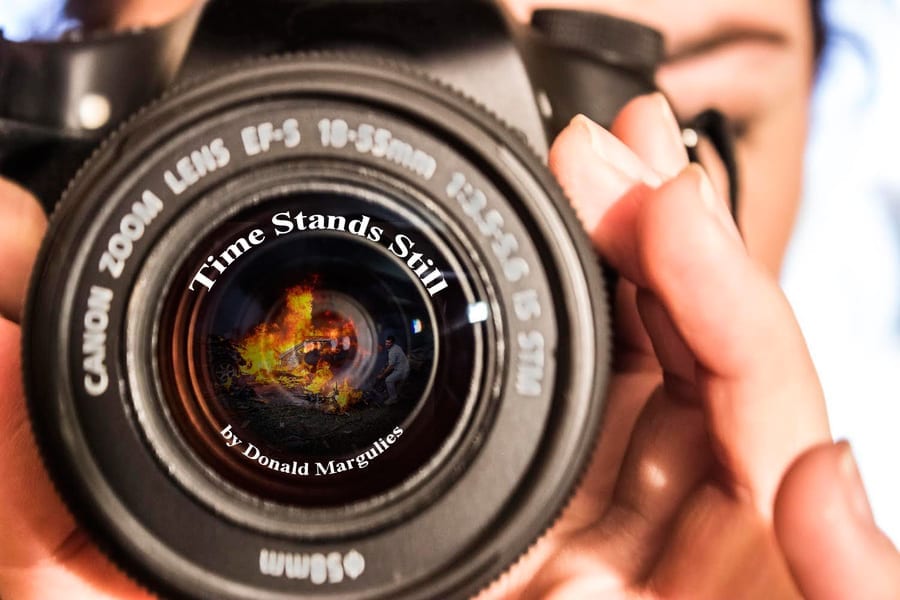SALT LAKE CITY — Pinnacle Acting Company has firmly proven itself to be a company of quality and merit through memorable productions like Betrayal, Boeing-Boeing, and Who’s Afraid of Virginia Woolf? PAC’s latest offering Time Stands Still, a Utah premiere, toes that line. Written by Pulitzer Prize winning playwright Donald Margulies, Time Stands Still focuses on the relationship between photo-journalist Sarah and foreign correspondent James as they attempt to adjust to stateside life after Sarah is injured by a road-side bomb in Iraq. Sarah is antsy and independent and James is wracked with guilt over not being with Sarah when she was injured. The couple clumsily readjust to domesticity as James frets over the wounded Sarah, showing the fissure cracks in their partnership caused by trauma. Add to the mix Richard—Sarah and James’s longtime friend and editor—and Richard’s much younger girlfriend—Mandy—and you have drama.

The play is not political per se, but touches on many themes that make it appear so. What is the line between witnessing history and exploiting those who see the worst of it? How much action is the average person responsible for taking during tumultuous world events? Is choosing to be a mom less respectable than pursuing a career? How can desire to change the world and the need for safety coexist? Though none of these themes emerge as a dominant message, the questions they pose are worth considering.
The action all takes place in James and Sarah’s Brooklyn loft (smartly designed by Jared Larkin), set in the round with audience on all sides. Director L.L. West uses this layout well, creating a different perspective for each audience member. Much like an art photographer staging an editorial, West blocks each moment and scene with careful composition that capture purposeful stage pictures as the plot unfolds. Melanie Nelson portrays Sarah with grit and determination, reflecting her necessary detachment from her subject matter in her personal interactions. Jared Larkin shows the whole range of James’s emotional state: wounded pride mixed with guilt at war with a desperate need for normalcy as he faces his own demons brought home from war zones. Larkin and Nelson ground the show with their natural relationship. It is obvious that these two trust each other and have a long shared history, but the chemistry between them is sometimes lacking.

Brook Robertson gives a respectable performance as Richard, providing contrast as the “company man” responsible for marketing the horrors Sarah and James witness and report. Rounding out the cast is Ali Lente as Mandy. Mandy is young, naive, unconsciously oblivious to how inane she sounds, and surprisingly in touch with her emotions. Lente plays up Mandy’s inherent humor and often diffuses strained moments that border on uncomfortable.
The cast is solid, but there are odd moments on stage. The play is less action driven and more a psychological study of people in crisis and transition. The script has several lines that I think are intended as dramatic statements, but ring hollow and can’t help but sound forced. Because of the weakness in the text, the performers have exchanges that become unduly intensified in order to justify the behaviors of the characters. No one character is truly likable, but their selfish actions are understandable. Larkin’s James appears to have the most complete arc, experiencing a cycle similar to the stages of grief: mourning not only his relationship with Sarah before he accident, but also his professional expectations. Under West’s direction Larkin is able to show this process with subtlety, contrasting the broader reactions of Nelson’s Sarah. Sarah can’t give up her life before and slip quietly into domestication, no matter the cost mentally, physically, or personally. Nelson did not shy away from Sarah’s brash honesty and ambition. I so desperately wanted to see a choice for Sarah, one that allowed growth and Nelson to portray that growth, but Margulies’s script disappointingly did not provide this.
The show’s technical elements serve the show well. Melanie Nelson’s costumes are appropriately modern and fit the characters and Natalie Colony‘s lighting creates the many moods necessary to highlight a one location set. Sound design by Amanda Hayter helped set the mood and tone appropriately. The most outstanding technical element was an uncredited make-up design resulting in Sarah’s scars. The actors are in close proximity to the audience and from every angle these scars looked authentic, a consistent reminder of the danger Sarah and James have chosen to risk for so long.
Overall, Time Stands Still is a strong play that deserves an audience. While the script itself was not my favorite, the ensemble and direction create a performance worth experiencing.
[box type=”shadow”]The Pinnacle Acting Company production of Time Stands Still performs at the Dumke Student Theatre in the Jewett Center for the Performing Arts on the campus of Westminster College. Remaining performances are January 16 and 17 at 7:30 pm and January 17 and 18 at 2:00 pm. Tickets are $15-18. For more information, visit pinnacleactingcompany.org.[/box]
